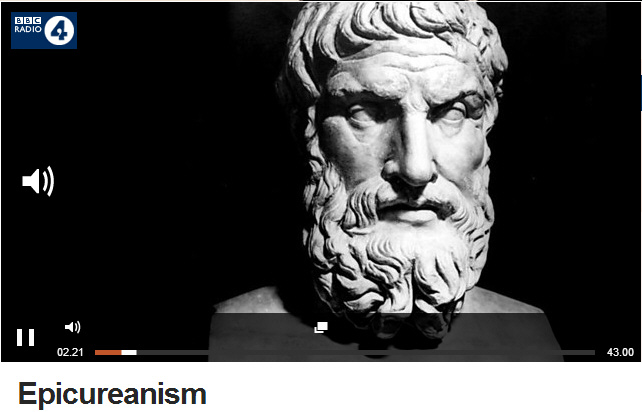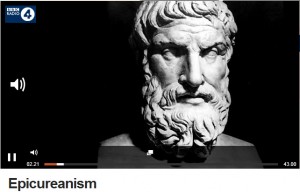Excellent BBC Radio Interview Presentation: “Epicureanism” On Melvyn Bragg’s “In Our Time”
Check out an excellent new presentation from the BBC’s radio program “In Our Time” by clicking the graphic to the left. This February 7, 2013, interview features Angie Hobbs, James Warren, and David Sedley. Here are several comments:
This is from the blurb at the website: “At the centre of his philosophy is the idea that the goal of human life is pleasure, by which he meant not luxury but the avoidance of pain. His followers were suspicious of marriage and politics but placed great emphasis on friendship.” I would suggest we consider: (1) Is pleasure the “goal” of human life, or the “guide”? Lucretius’ phrase was “divine pleasure, GUIDE of life” – and those are very different words. (2) “pleasure, by which he meant not luxury but he avoidance of pain.” Is that a sufficient description? It is easy to avoid pain by suicide, but Epicurus said a man who does that is of small account. “Avoidance of pain” is probably a deceptively simple summary of “pleasure”. (3) “Suspicious of marriage” – As I understand it, this is based on a passage that is garbled and difficult to be sure whether the meaning was in fact the opposite. What we apparently know for sure is that while Epicurus himself was not married, he provided for the marriage of one of his friend’s children in his will. Seems to me the likelihood is that marriage was fine and suggested for most people, but only when both spouses are Epicurean.
Also, be sure to listen at the 31:58 point, where James Warren says “Stoicism in many ways is quite different from Epicureanism on all major philosophical topics,” and gives a quick good summary.
This interview by Melvyn Bragg results in an excellent summary presentation and one of the best I have heard! And if you want a more attractive graphic while you listen, check out one of the very attractive participants – Angie Hobbs: http://angiehobbs.com/
Note: Only one thing is missing from the reading list at the page linked above – the best summary of Epicurean philosophy – Norman Dewitt’s “Epicurus and His Philosophy”


